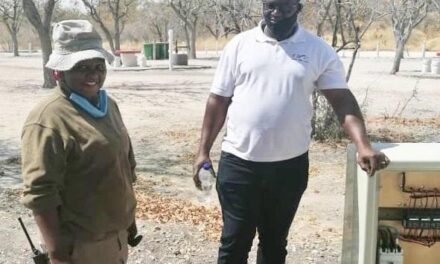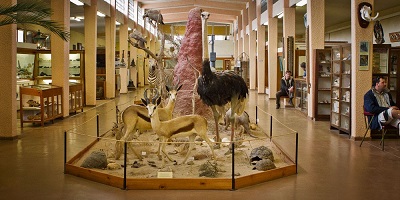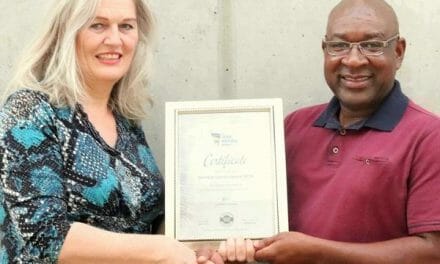
Fields guides learn more at Erindi


Wild man Gerhard van Niekerk is the EcoTraining instructor who took eight Namibian field guides through a month-long course to uplift their skills in reading the signs of the bush.
Managed conservation joined forces with unspoilt wilderness when eight field guides reported for an intensive training course teaching them the finer elements of tracking, guiding and survival. The course was presented by well-known South African wild man, Gerhard van Niekerk and conducted on Erindi Private Game Reserve’s almost 100,000 ha fenced-in land, as well as the rugged, virgin wilderness of the Kunene Region. The guides completed their course last week. To date, 116 trainee guides have completed the course.
The project, funded by the not-for-profit Amarula Trust, saw the eight Namibian guides undergo a month-long course at the Erindi Private Game Reserve and Wilderness Safaris Damaraland Adventure Camp in Kunene. This is the fourth time Namibian candidates have benefitted from the programme that extends field guide training provided by EcoTraining in association with the Field Guide Association of South Africa (FGASA).
Hardie Basson, marketing manager of Distell, Amarula’s parent company in Namibia, Botswana, Lesotho and Swaziland, said the building of rural skills to support eco-tourism is critical. “The growth in tourism means there is an increasing demand for qualified field guides to host mostly foreign guests. By facilitating the provision of skills, the Amarula Trust is also helping to tackle unemployment.
“The Amarula Field Guide Scholarship programme is a very important part of the work of the trust that focuses on promoting social sustainability and conservation. Begun in 2010 in Botswana, the programme was extended in 2011 to South Africa and in 2012 to Namibia.”
Candidates with the potential to develop their careers who are currently working in entry-level positions at game lodges and private reserves are chosen by their employers for the project, When they are promoted after undergoing the course, and they vacate their positions, they also create employment opportunities for others.
The latest Namibian course involved eight candidates from six game lodges and private reserves. Students were taught about the natural environment and ecology, with the accent on climate, biomes and diversity. Some of the areas they covered included arthropods, amphibians, reptiles, birds, mammals, geology and soils. They also learned about astronomy, tracking, how to drive a 4×4 and even hosting of guests.
“Some of the students come to the course with a basic understanding of their natural environment. The course builds on that and then formalises their knowledge and skills. It also teaches effective communication: how to transfer knowledge to tourists in a fun, interactive and informative manner,” said EcoTraining instructor van Niekerk.
He said many of those who benefitted from previous training courses run in South Africa, Botswana and Namibia, now work as field guides in reserves and at private lodges. Some are in reserve or lodge management, while others had continued their studies to become academic researchers.
“We encountered an elephant cow with her calf at the Wilderness Safaris Damaraland Adventure Camp,” said Rector Tetuka, a student from the Gondwana Namushasha River Lodge on the banks of the Kwando. “This was the first time for many of us to come across elephants on foot. We were instructed to stand very still in a non-threatening way, and then to go down on our knees while the elephant cow and her calf passed by literally a few metres from where we were.”
“It was exhilarating, but very scary. Experiences like this teach us to truly respect animals in their natural environments. Here they set the rules, not the humans.”
Students also learned to analyse elephant dung. Sheldin Naruseb, a student from Erindi Private Game Reserve, observed: “Generally speaking, if the tree bark and leaves in the dung are finely chewed, the elephant is considered young to middle-aged. This is because during their lifetime, elephants go through six sets of large teeth. When the elephant’s final set of teeth falls out, the animal slowly dies of malnutrition or starvation as it can no longer chew its food to release the essential nutrients.”
The Amarula Trust owes its origins to Amarula Cream made from the marula fruit that is indigenous to the savannah of southern, eastern and central Africa. The tree also grows widely in the Sahel. Elephants and other game are known to enjoy its taste. It is produced by the Distell Group, based in South Africa, and is the world’s second biggest cream liqueur.













































